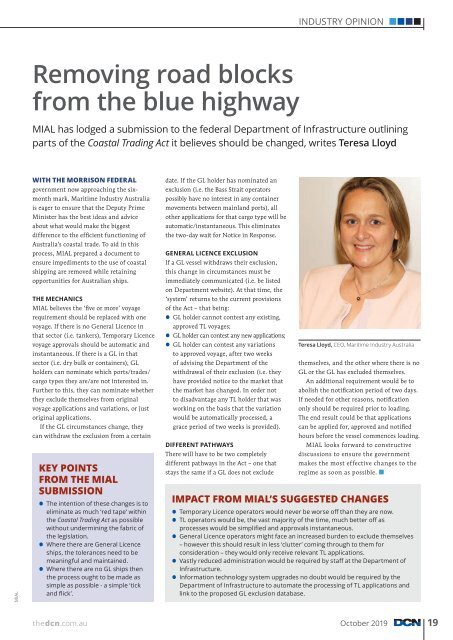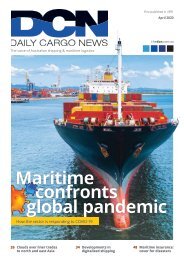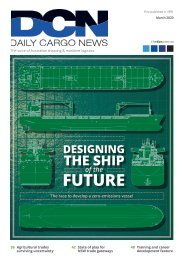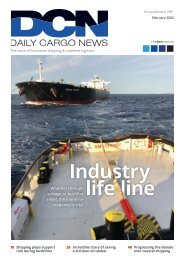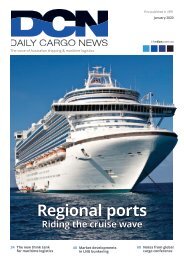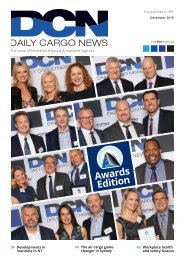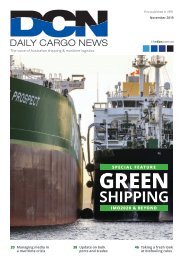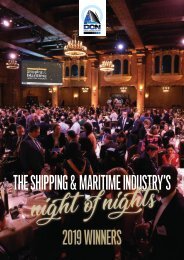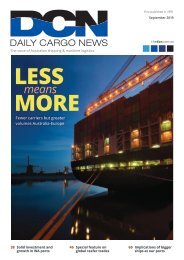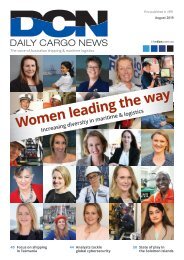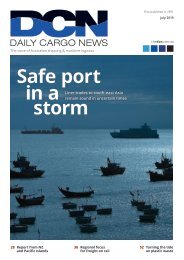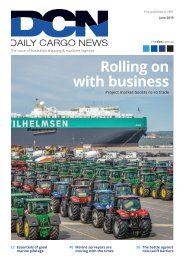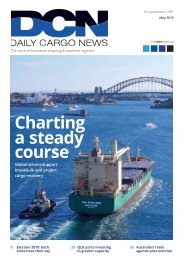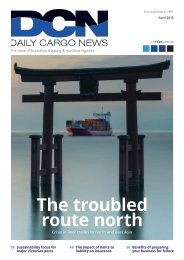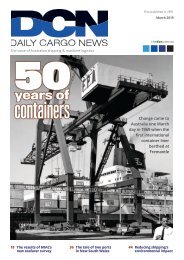DCN October Edition 2019
Create successful ePaper yourself
Turn your PDF publications into a flip-book with our unique Google optimized e-Paper software.
INDUSTRY OPINION<br />
Removing road blocks<br />
from the blue highway<br />
MIAL has lodged a submission to the federal Department of Infrastructure outlining<br />
parts of the Coastal Trading Act it believes should be changed, writes Teresa Lloyd<br />
MIAL<br />
WITH THE MORRISON FEDERAL<br />
government now approaching the sixmonth<br />
mark, Maritime Industry Australia<br />
is eager to ensure that the Deputy Prime<br />
Minister has the best ideas and advice<br />
about what would make the biggest<br />
difference to the efficient functioning of<br />
Australia’s coastal trade. To aid in this<br />
process, MIAL prepared a document to<br />
ensure impediments to the use of coastal<br />
shipping are removed while retaining<br />
opportunities for Australian ships.<br />
THE MECHANICS<br />
MIAL believes the ‘five or more’ voyage<br />
requirement should be replaced with one<br />
voyage. If there is no General Licence in<br />
that sector (i.e. tankers), Temporary Licence<br />
voyage approvals should be automatic and<br />
instantaneous. If there is a GL in that<br />
sector (i.e. dry bulk or containers), GL<br />
holders can nominate which ports/trades/<br />
cargo types they are/are not interested in.<br />
Further to this, they can nominate whether<br />
they exclude themselves from original<br />
voyage applications and variations, or just<br />
original applications.<br />
If the GL circumstances change, they<br />
can withdraw the exclusion from a certain<br />
KEY POINTS<br />
FROM THE MIAL<br />
SUBMISSION<br />
• The intention of these changes is to<br />
eliminate as much ‘red tape’ within<br />
the Coastal Trading Act as possible<br />
without undermining the fabric of<br />
the legislation.<br />
• Where there are General Licence<br />
ships, the tolerances need to be<br />
meaningful and maintained.<br />
• Where there are no GL ships then<br />
the process ought to be made as<br />
simple as possible - a simple ‘tick<br />
and flick’.<br />
date. If the GL holder has nominated an<br />
exclusion (i.e. the Bass Strait operators<br />
possibly have no interest in any container<br />
movements between mainland ports), all<br />
other applications for that cargo type will be<br />
automatic/instantaneous. This eliminates<br />
the two-day wait for Notice in Response.<br />
GENERAL LICENCE EXCLUSION<br />
If a GL vessel withdraws their exclusion,<br />
this change in circumstances must be<br />
immediately communicated (i.e. be listed<br />
on Department website). At that time, the<br />
‘system’ returns to the current provisions<br />
of the Act – that being:<br />
• GL holder cannot contest any existing,<br />
approved TL voyages;<br />
GL holder can contest any new applications;<br />
• GL holder can contest any variations<br />
to approved voyage, after two weeks<br />
of advising the Department of the<br />
withdrawal of their exclusion (i.e. they<br />
have provided notice to the market that<br />
the market has changed. In order not<br />
to disadvantage any TL holder that was<br />
working on the basis that the variation<br />
would be automatically processed, a<br />
grace period of two weeks is provided).<br />
DIFFERENT PATHWAYS<br />
There will have to be two completely<br />
different pathways in the Act – one that<br />
stays the same if a GL does not exclude<br />
Teresa Lloyd, CEO, Maritime Industry Australia<br />
themselves, and the other where there is no<br />
GL or the GL has excluded themselves.<br />
An additional requirement would be to<br />
abolish the notification period of two days.<br />
If needed for other reasons, notification<br />
only should be required prior to loading.<br />
The end result could be that applications<br />
can be applied for, approved and notified<br />
hours before the vessel commences loading.<br />
MIAL looks forward to constructive<br />
discussions to ensure the government<br />
makes the most effective changes to the<br />
regime as soon as possible.<br />
IMPACT FROM MIAL’S SUGGESTED CHANGES<br />
• TL operators would be, the vast majority of the time, much better off as<br />
processes would be simplified and approvals instantaneous.<br />
•<br />
Temporary Licence operators would never be worse off than they are now.<br />
General Licence operators might face an increased burden to exclude themselves<br />
– however this should result in less ‘clutter’ coming through to them for<br />
consideration – they would only receive relevant TL applications.<br />
• Vastly reduced administration would be required by staff at the Department of<br />
Infrastructure.<br />
•<br />
Information technology system upgrades no doubt would be required by the<br />
Department of Infrastructure to automate the processing of TL applications and<br />
link to the proposed GL exclusion database.<br />
thedcn.com.au <strong>October</strong> <strong>2019</strong> 19


